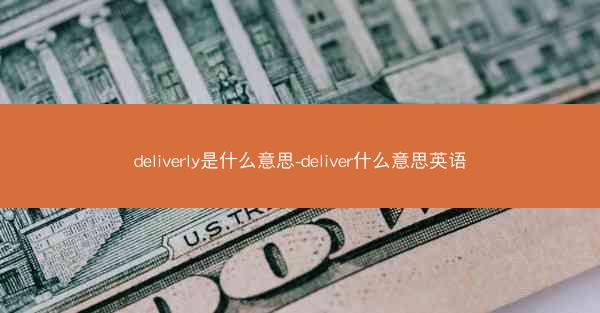deliverly是什么意思-deliver什么意思英语
分类:新闻中心 | 发布时间:2025-03-19 09:21 | 来源:TG中文电报官网

Deliverly is a term that combines the words deliver and utility, suggesting a concept that revolves around the act of delivering something with added efficiency or value. In the context of modern business and technology, deliverly can refer to a variety of services or systems designed to enhance the delivery process, making it more streamlined, reliable, and customer-centric.
Understanding the Word Deliver
The word deliver has a broad range of meanings in the English language. At its core, it refers to the act of handing over, conveying, or transmitting something from one person or place to another. This can include physical goods, services, information, or even ideas. The word is often used in contexts such as delivering a package, delivering a speech, or delivering a baby.
Deliverly in Logistics
In the realm of logistics and supply chain management, deliverly can refer to the use of advanced technologies and strategies to improve the delivery process. This might involve real-time tracking systems, predictive analytics, and automated delivery vehicles. By enhancing the deliverly, companies can reduce costs, minimize delivery times, and improve customer satisfaction.
Deliverly in E-commerce
In the context of e-commerce, deliverly is crucial for ensuring a seamless shopping experience. It encompasses everything from the moment an order is placed to the moment it is received by the customer. This includes efficient order processing, packaging, and the use of reliable delivery services. A strong deliverly system can be a significant competitive advantage for online retailers.
Key Components of Deliverly
To achieve effective deliverly, several key components must be in place:
1. Technology Integration: Utilizing technology such as GPS, IoT, and AI to track and manage deliveries in real-time.
2. Efficient Routing: Optimizing delivery routes to minimize travel time and fuel consumption.
3. Customer Communication: Keeping customers informed about the status of their deliveries through updates and notifications.
4. Scalability: Ensuring that the deliverly system can handle increased demand without compromising on service quality.
5. Sustainability: Incorporating environmentally friendly practices into the delivery process to reduce the carbon footprint.
Challenges in Deliverly
Despite the advancements in technology, there are several challenges that can impact deliverly:
1. Traffic and Urban Planning: Navigating through crowded cities and inefficient urban planning can lead to delays.
2. Weather Conditions: Adverse weather can disrupt delivery schedules and require contingency planning.
3. Last-Mile Delivery: The final leg of the delivery process can be the most challenging, often requiring complex logistics to reach the customer's doorstep.
4. Security and Fraud: Ensuring the safety of deliveries and protecting against fraud and theft is a constant concern.
The Future of Deliverly
The future of deliverly is likely to be shaped by further technological advancements and evolving consumer expectations. Innovations such as drone delivery, autonomous vehicles, and blockchain technology could revolutionize the way goods and services are delivered. As a result, the concept of deliverly will continue to evolve, aiming to provide faster, more reliable, and more sustainable delivery solutions for businesses and consumers alike.
相关内容推荐:
- 2025-03-22 10:52galgame怎么调双语字幕-galgame怎么换字体
- 2025-03-19 12:55deliveryoptimization服务是什么-deliveryoptimization可以删除吗
- 2025-03-22 09:28galgame语音打不开-galgame的语言文件是哪个
- 2025-03-21 06:27galgame朋友圈背景动态视频-galgame背景素材
- 2025-03-22 05:51galgame邮箱注册-galgamenet账号注册
- 2025-03-27 21:41海豚湾是干嘛的
- 2025-03-12 08:51telegram下戴
- 2025-03-25 00:13纸飞机telegeram收不到短信怎么办
- 2025-03-16 21:53telegram 搜索group
- 2025-03-15 14:09telegraph安卓下载安全
- 推荐阅读
- 最热文章